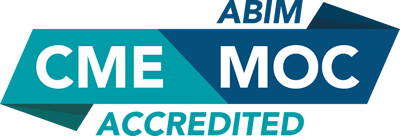
COURSE CREDITS & HOURS
AMA PRA Category 1 Credits™14 ACPE Credits
14.0 (part II) MOC points in medical knowledge in the American Board of Internal Medicine's (ABIM) Maintenance of Certification (MOC) program
COURSE FEES
TARGET AUDIENCE
PROGRAM PURPOSE
- Antibiotic Treatment Guidelines: Separating fact from fiction
- Identify for the conference members the discrepancies between current guideline recommendations and the current literature on the subject.
- Critical Review of the 2016 Surviving Sepsis Campaign
- The Surviving Sepsis Campaign was recently updated. Realize the important points that impact patient care.
- Fungal Infections in the ICU
- Currently different organizations vary in their recommendations on when to use the available anti-fungal therapies.
- Develop a practice based plan for the use of the available anti-fungal therapies.
- ARDS Clinical Update
- Current clinical practice in patients with ARDS often does not follow the most recent literature.
- Upon completion of this lecture, clinicians should be able to practice more evidence based medicine.
- Infection control practices in the ICU: What is the evidence?
- Upon completion of this lecture, clinicians should be able understand and implement cost effective infection control measures in their practice.
- Management of Embolic Stroke
- Currently different organizations vary in their recommendations on treatment of CVAs and related complications.
- Critically review the management of acute embolic strokes.
- Critical Care Controversies: Transfusion in the ICUs
- Identify the appropriate transfusion trigger in the critically ill and the risks associated with transfusion. Also discussion transfusion practices for massive transfusions.
- Forces of Change: The Physician's Place in the Evolution of Modern Healthcare
- Identify salient forces that are driving rapid and uncomfortable health system evolution
- Leverage new insights into a more rewarding practice, renewing connections with core motivators, and contributing to system improvement.
- Physician Leadership: The Mirror and the Lamp. What is Takes to be an Effective Leader in Today's Health Services Environment
- Recognize and apply suitable leadership insights and skills.
- Antithrombotics and Management of Bleeding
- Apply the current evidence base to selecting an appropriate antihrombotic agent and integrate bleeding risk and bleeding management strategies into clinical practice.
- Diagnostic Error and Cognitive Bias
- Cite and discern, in oneself and in others, the cognitive biases and heuristics that lead to diagnostic errors.
- Mayday! Mayday! Identifying and Managing the Crashing Inpatient
- Identify and cite diagnostic categories of deteriorating patients
- Apply the available evidence to recognize and improve such patients' outcomes and avoid using common techniques that can actually make things worse!
- Identify and cite diagnostic categories of deteriorating patients.
- Apply the available evidence to recognize and improve such patients' outcomes and avoid using common techniques that can actually make things worse!
- Post Cardiac Arrest Management: Update on Targeted Temperature Management
- Explain why the main focus in the post cardiac arrest scenario must be on optimizing brain function and advocate for and institute temperature control in this circumstance to achieve that goal.
- MAiD in Ontario: Medical Assistance in Dying, The Ontario Experience
- Cite the Canadian and Ontario legislative and clinical history leading up to the legalization of MAiD, relate our experience in advocating for and providing MAiD and evaluate the process whereby this service is provided.
- Anticoagulation, Antithrombotics, and Management of Bleeding




























